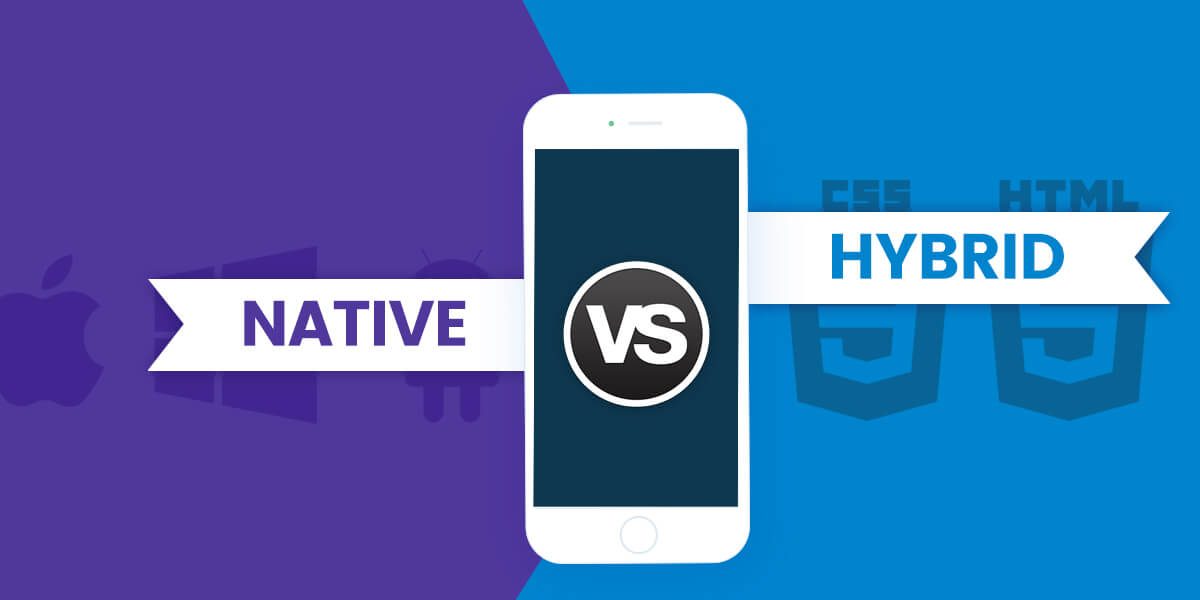Native vs Hybrid App, Which One Dominates Over Other?
In today’s era, a mobile app has become the kingpin of innovation. With the growing market of mobile devices each organization wants to incorporate their mobile apps into the business flow, but here is the deal to decide which programming language will be more favorable for the project. Even though most of the vendors are technically sound nowadays, they still lack those skills to select the language that best suits their requirements. In this article, we will discuss Native vs Hybrid App, which one to choose?
A mobile app can be classified into two categories [Broadly three categories are there since the arrival of React-Native and Flutter]
# HYBRID APPS
The hybrid app is essentially the pre-loaded web view as a browser instance. Hybrid app development serves quicker and cheaper ways of developing the mobile app providing the support for cross-platform thus reduces the time and budget of software development. The languages that support hybrid app development are Ionic, Cordova, PhoneGap, React-Native, Flutter, etc
# NATIVE APP
A native app is a program that specifically developed for the device having the specific OS. Since it can only be developed for a specific platform it results in higher expense as well as the maintenance of the software. Whereas native apps having a higher degree of performance than the hybrid apps. The popular languages used for native app design and development are Objective-C and Swift for iOS, Java, and Kotlin for Android, C# for Windows app.
HERE IS THE FUZZ! Native vs Hybrid App – What to choose?
Like everything, there are certain pros and cons of each programming language. It is more challenging to decide which app development approach you should follow.
Advantages of Developing a Native App
- Graphical Applications, HD games, intensive animation applications might perform well as a native app because Native code is still faster than HTML and JavaScript.
- Since the native app is faster, paid apps are usually advised to be developed as a native app. A native app has exceptional performance over a hybrid app.
Native functionality makes tapping into the camera, microphone, compass, accelerometer, and swipe gestures super easy on the app. It’s still possible using the alternatives, but it’s easiest on native.
The Advantages of Developing a Hybrid App
A single piece of code will run on all operating systems as the hybrid apps are basically the progressive web view [React-Native uses the native component for UI/UX design]. A single team can handle the app development along with the website as it requires expertise in web technology.
Frequent updates are not required to be uploaded with a new version of the app on the respective store, one can easily update it by updating the bundle package. A lot of frameworks are available in the market to speed up the development process.
Hybrid apps are easier to scale to other platforms, once you’ve built for one platform you can publish to another platform like a native app. Hybrid functionality lets you retain the same ability to device features like the camera, location, speedometer, etc.
Cheaper than the native app even with the low budget you can build an app that works on all platforms.
– Cons of Hybrid App
The hybrid app enables access to all the device features like touchId, media, location, etc but depends on native plugin. Sometimes there might be chances that new device features are readily available as native plugins. So, you must know that this will add more complexity to the code if you are about to develop your plugin.
Performance is the major issue in the hybrid apps as there is a third layer which is responsible for converting the hybrid code to native code resulting in a drastic degradation of app’s performance. An app that needs to update the UI thread frequently has to go through the bridge to do so, hence result in poor performance of the app. Due to this behavior, developers are forced to move to native app development.
The hybrid app has a dependency on a third-party framework like ionic, Cordova which has to update its framework as the technology grows. Thanks to facebook community support that has made the framework open source and always ready to accept the solution to the known problem.
– Cons of Native App
The different codebase is required for different platforms that result in repetitive checks into the time function while developing the native application. Separate development efforts for each platform also increase the overall development time. In addition to this, different skill sets are required to develop the same feature on different platforms.
Difficult to maintain, the development process is expensive and requires regular maintenance of codes. Small changes in the functionality require the heavy process of uploading the build to the store.
Before development, proper analysis is required to determine the relevancy & usability of all features. Therefore, this cannot be the best solution in case of a low budget.
Conclusion
In the midst of dilemmas imposed on you for choosing the right tools & technologies, it is prerequisite to clarify your doubts regarding Native vs Hybrid app. Each development approach has pros and cons. There are always certain limitations of time and money that will push you to make a decision about your app. When it comes to time and money-saving approach, HYBRID APP is the best you can hope for, as it requires the limited resource and time. But for the longest run, you can go for the “NATIVE APP”. Furthermore, a native approach offers the best-in-class security for a mobile application, the best performance, a highly responsive user interface, and access to all native APIs.
-

 Mobilecoderz Awarded as India’s Best iPhone App Development Company by Clutch
Mobilecoderz Awarded as India’s Best iPhone App Development Company by Clutch -

 How Much Does It Cost to Develop a SaaS Application?
How Much Does It Cost to Develop a SaaS Application? -

 Mobilecoderz recognized as the Top App Development Company in Saudi Arabia by GoodFirms
Mobilecoderz recognized as the Top App Development Company in Saudi Arabia by GoodFirms










